Technology
Samsung Electronics' second-quarter profit is expected to fall by 39 per cent due to sluggish sales of AI chips.

Samsung Electronics is expected to announce a 39% drop in its second-quarter operating profit on Tuesday, largely due to delays in delivering advanced memory chips to AI chip leader Nvidia. According to LSEG SmartEstimate, the world’s largest memory chip producer is forecast to post an operating profit of 6.3 trillion won ($4.62 billion) for the April-June period — its weakest performance in six quarters.
The extended decline in profitability has heightened investor concerns about Samsung's ability to compete with smaller rivals in the race to develop high-bandwidth memory (HBM) chips essential for AI data centers. While competitors like SK Hynix and Micron have seen strong demand for AI-related memory chips, Samsung’s progress has been hampered by its reliance on the Chinese market, where U.S. restrictions limit sales of advanced chips.
Analysts noted that Samsung’s efforts to get its HBM3E 12-layer chips certified by Nvidia are progressing slowly. “Revenue from HBM likely remained flat in Q2 due to ongoing China-related restrictions and the lack of HBM3E shipments to Nvidia,” said Ryu Young-ho, a senior analyst at NH Investment & Securities. He added that significant shipments to Nvidia this year are unlikely.
Although Samsung previously expected meaningful progress with its HBM chips by June, it declined to confirm whether the HBM3E chips had passed Nvidia’s qualification. However, AMD confirmed in June that Samsung has started supplying the chip to them. Meanwhile, Samsung's smartphone sales appear stable, boosted by stockpiling ahead of possible U.S. tariffs on imported phones, analysts said. Still, the company faces continued business uncertainty due to shifting U.S. trade policies, including proposed tariffs on foreign-made smartphones and a looming July 9 deadline for potential retaliatory tariffs on major trade partners.
The U.S. government is also considering revoking key technology licenses for global chipmakers, including Samsung, which could affect operations at their facilities in China. Samsung shares, despite being the weakest performer among major memory chip stocks this year, have risen around 19% — trailing the KOSPI index's 27.3% gain.



